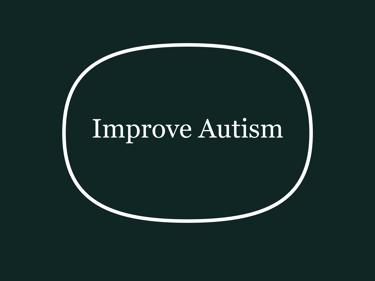Microbiota Transfer Therapy alters gut ecosystem and improves gastrointestinal and autism symptoms: an open-label study
Authors:
Kang, D.W., Adams, J.B., Gregory, A.C., Borody, T., Chittick, L., Fasano, A., Khoruts, A., Geis, E., Maldonado, J., McDonough-Means, S. and Pollard, E.L.
https://pubmed.ncbi.nlm.nih.gov/28122648/
doi: 10.1186/s40168-016-0225-7
Summary of study
The study found that MTT significantly improved GI symptoms (80% reduction) and ASD-related behavioral symptoms in children with ASD, with effects noticeable by the end of the 10-week treatment and persisting for at least 8 weeks post-treatment. GI symptoms like constipation, diarrhea, indigestion, and abdominal pain improved, alongside ASD symptoms such as social impairments and problem behaviors. Out of 18 participants, 16 (89%) benefited significantly in terms of GI symptoms, and the majority also experienced ASD symptom improvements. These findings suggest MTT as a promising approach, though the open-label nature of the study calls for further validation in controlled trials.
Key Findings
The study demonstrated that MTT, which involved a 2-week antibiotic treatment, a bowel cleanse, and an extended fecal microbiota transplant (FMT) over 7-8 weeks, led to significant improvements in both GI and ASD-related symptoms in children with ASD. These improvements were accompanied by beneficial changes in the gut microbiome. Here’s a detailed breakdown:
GI Symptom Improvements:
Measured using the Gastrointestinal Symptom Rating Scale (GSRS), GI symptoms improved by approximately 80% by the end of the 10-week treatment period.
Specific symptoms that showed significant improvement included constipation, diarrhea, indigestion, and abdominal pain.
These improvements persisted, with a 77% reduction from baseline still observed 8 weeks after treatment ended.
ASD Symptom Improvements:
Behavioral symptoms related to ASD improved significantly, as assessed by multiple clinical tools:
Parent Global Impressions-III (PGI-III): Indicated overall improvement in autism-related symptoms.
Childhood Autism Rating Scale (CARS): Showed a reduction in autism severity.
Aberrant Behavior Checklist (ABC): Demonstrated decreases in problem behaviors such as irritability, lethargy, stereotypy, hyperactivity, and inappropriate speech.
Social Responsiveness Scale (SRS): Highlighted improvements in social impairments, including social awareness and communication.
The Vineland Adaptive Behavior Scale II (VABS-II) was also used but assessed only at baseline and the end of the observation period, complementing other findings with improvements in adaptive skills.
Microbiome Changes:
MTT increased bacterial diversity and the abundance of beneficial bacteria such as Bifidobacterium and Prevotella, which persisted 8 weeks post-treatment.
The gut microbiota of children with ASD shifted toward that of neurotypical controls and their donors, suggesting successful partial engraftment of donor microbiota.
Timeline for Autism Symptom Improvement
Improvement Onset: The study notes that improvements in ASD symptoms were observed gradually over the 10-week treatment period. Unlike treatments for conditions like Clostridium difficile infection, where recovery is rapid, the benefits in this study developed slowly and steadily.
Full Effect: Significant improvements in ASD symptoms were evident by the end of the 10-week MTT treatment (week 10).
Persistence: These improvements remained significant 8 weeks after treatment stopped (week 18 of the study), indicating a sustained effect over the observation period.
Thus, autism symptoms began improving during the 10-week treatment and were fully noticeable by the end of this period, with benefits maintained for at least 8 weeks afterward.
Specific Symptoms That Improved
The study identified improvements in both GI and ASD-related symptoms. Here’s a detailed list:
GI Symptoms:
Constipation: Reduced frequency and severity.
Diarrhea: Decreased occurrence.
Indigestion: Lessened discomfort.
Abdominal Pain: Significant reduction in pain levels.
These were quantified via the GSRS, showing an overall 80% reduction by week 10.
ASD-Related Behavioral Symptoms:
Social Impairments: Improved social awareness, communication, and responsiveness (SRS).
Problem Behaviors: Reduced irritability, lethargy, stereotypy, hyperactivity, and inappropriate speech (ABC).
Autism Severity: Lowered severity scores (CARS).
Overall Change: Positive shifts in parental perception of autism-related symptoms (PGI-III).
These improvements suggest that MTT addressed both the physical GI issues and the behavioral manifestations of ASD.
Number of Participants Who Benefited
Study Population: The study involved 18 children with ASD, aged 7-16 years, all of whom completed the 18-week trial (10 weeks of treatment plus 8 weeks of follow-up).
GI Symptom Responders:
16 out of 18 children (89%) experienced significant benefits, defined as a greater than 50% reduction in GSRS scores.
Only 2 out of 18 children (11%) were classified as non-responders, achieving less than a 50% reduction in GI symptoms.
ASD Symptom Responders:
The study reports significant improvements in ASD symptoms across the participants, as assessed by PGI-III, CARS, ABC, and SRS. However, it does not specify an exact number of responders for ASD symptoms in the same way as for GI symptoms. The general finding is that the majority benefited, with improvements observed consistently across the group by the end of treatment and sustained 8 weeks later.
Thus, 16 out of 18 children (89%) clearly benefited in terms of GI symptom reduction, and the majority also showed improvements in ASD symptoms, though a precise count for ASD-specific responders is not detailed beyond the group-level significance.


